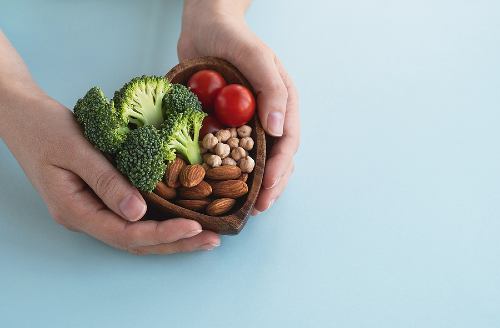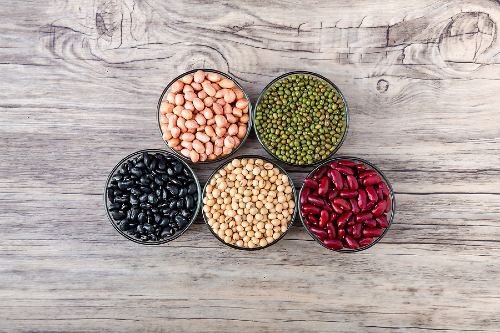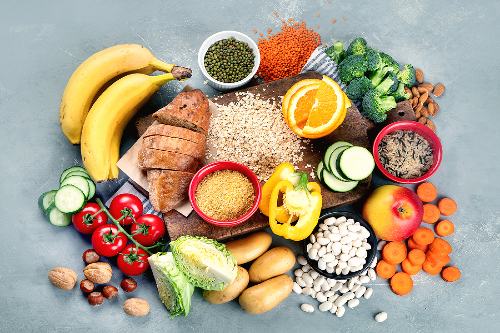Is it just a trend or can it actually be beneficial to your health? In this blog, we break down what it means to eat a “plant-based” diet.
What is a plant-based diet?
A plant-based diet focuses on filling your plate with foods that come from plants. This includes foods such as:
- Fruits
- Vegetables
- Whole grains
- Legumes
- Nuts and seeds [1]
A common misconception of plant-based diets is that there is no room for animal products (meat, fish, poultry, dairy, or eggs). This is not the case! Keep reading to learn how easy it is to customize a plant-based diet to your needs and preferences.
Is following a plant-based diet good for my health?
The science speaks for itself. Eating more plant foods lowers your risk of disease and increases overall health. [2] In fact, the 2020-2025 Dietary Guidelines for Americans support plant-based eating as a healthy and balanced dietary pattern to prevent disease and promote health. [3]
Studies have found that plant-based diets offer the following health benefits:
- Reduced risk of heart disease
- Reduced risk of stroke
- Weight loss
- Improved blood pressure
- Lower cholesterol levels [1]
But what makes a plant-based diet so beneficial? Meat (including steak, ground beef, pork, etc.) has high levels of saturated fat and cholesterol. Processed meats like bacon or deli meats are also high in sodium. These are all nutrients that can be harmful to your health when you eat too much of them.
However, plants do not naturally contain saturated fat, cholesterol, or sodium. This means that choosing to eat plant-based reduces the sources of these nutrients in your diet. Choosing to eat less meat is a small change that can lower the risk of various cardiovascular diseases. [2]

Is plant-based the same as vegan or vegetarian?
Yes and no. Vegan and vegetarian diets are types of plant-based eating. However, these diets differ in a few ways. A vegan diet does not include any animal products including meat, poultry, fish, eggs, dairy products, and some condiments such as mayonnaise or honey. Vegetarians exclude meat, poultry, and fish from their diets but typically still include eggs and dairy products. [1]
However, you do not need to cut out all sources of meat, fish, or poultry in order to follow a plant-based diet. Plant-based eating is all about increasing your sources of plant foods that are naturally full of healthy nutrients. There are many different ways to approach this type of eating while still enjoying the foods you love.

What are some plant-based sources of protein?
Good question. You might think that a plant-based diet is low in protein due to lower amounts of meat, fish, and poultry. This isn’t necessarily true! There are many sources of plant-based protein including:
- Canned beans and peas (chickpeas, black beans, pinto beans, snow peas, etc.)
- Dried beans and peas
- Soy products including tofu and soy milk
- Lentils
- Nuts and various nut butters
- Brown rice
- Whole grain products including breads, pasta, and crackers
- Quinoa
Many of the foods from the list above double as veggies on a standard plate. It is a good idea to read nutrition facts labels on these products to ensure that you are getting a proper amount of protein in your diet. If you are choosing to avoid meat and other animal products on a plant-based diet, you may consider planning out your meals ahead of time to include a range of plant-based protein sources.
Another common source of protein is dairy. While there are numerous health benefits of consuming dairy products (see our blog on dairy here), you may choose to cut back on this food group when following a plant-based diet. If this is the case, there are plenty of plant-based milk options like soy milk, almond milk, oat milk, and more! However, it is important to note that only fortified soy milk is currently the only plant-based dairy equivalent. [3] For a list of plant-based milks and their differences, check out our Milk in Review blog.

What can a plant-based diet look like?
People may choose to follow a plant-based diet for a variety of reasons. These could be related to health, ethics, or a combination of the two. No matter the reasons for your interest, plant-based diets are not meant to be restrictive and can easily be customized to you and your family’s needs.
If you are interested in switching to a plant-based diet, want to try a “Meatless Monday,” or just want to increase the number of fruits and veggies in your diet, here are some of our favorite plant-based dishes:
- If you are looking for plant-based breakfast options, look no further than our 3 Ingredient Cookies or our Apple Veggie Omelet.
- Lunch can be a hard meal to nail down, especially if you are trying out a new approach to eating. Try prepping our Slow Cooker Rice and Peas on Sunday to make weekday lunches a breeze.
- Plant-based eating can be fun for the whole family- our Rainbow Pizza proves it! This dish is a great option for dinner to increase your veggie intake in a colorful and delicious way.

Written by Darci Bell, RDN, LD | Edited by Leslie Davis, RDN, LD, CDCES , and the Nutrition Education Team
Posted on: June 21, 2021
